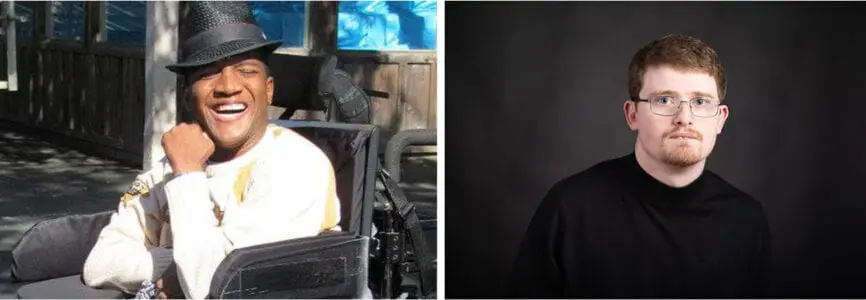Hastings Center News
Artistic Visions for Disrupting Ableism
What will it take to bring about lasting justice for disabled people in the United States? When will every body—and every voice—be indispensable? Poets and activists Lateef McLeod and D.J. Savarese explored their ideas in “Disrupting Ableism with Artful Activism,” a virtual Hastings Center event on December 7. It was the third in a series of events produced by the Center and supported by the National Endowment for the Humanities that explores the ways in which people with disabilities choose to use – or choose not to use – technologies to promote their own flourishing.
Watch the video of the full event.
The first presenter was Lateef McLeod, a poet, blogger, activist, and PhD candidate in the Anthropology and Social Change Doctoral program at California Institute for Integral Studies. His poetry, activism, and scholarship are all informed by his experience living in the Bay Area with cerebral palsy.
“Disabled writers, artists and activists have the great challenge of illustrating to the rest of society what it means to be disabled in America,” said McLeod, who has published two books of poetry. “We need to construct and articulate what a society would look like if disabled people are not a subordinate category in our culture. And what it would mean that people with disabilities had a strength and sense of self determination in our society.”
He read an excerpt of one of his poems, “I’m Too Pretty for Some Ugly Laws”:
I am too pretty for some Ugly Laws,
Too smooth to be shut in.
Too smart and eclectic
For any box you put me in.
My swagger is too bold
To be swept up in these public streets.
The other featured presenter was David James Savarese, an artful activist and founder of Listen2Us: Writing Our Own Futures, and co-producer and narrative commentator of the Peabody award-winning documentary, Deej: Inclusion Shouldn’t Be a Lottery. A graduate of Oberlin College, he has published widely, including his chapbook, A Doorknob for the Eye, and a notable essay in the 2018 Best American Essays, “Passive Plants.”
“I identify as an alternatively communicating synesthete, severely autistic,” he said. “I’d like to explore how creative forms of resistance, what I call artful activism, can be used to disrupt cultural misperceptions of the disabled, unearth the deep-seated assumptions that bury us and see possibilities for lasting cultural change.”
He discussed the process of making Deej: Inclusion Shouldn’t Be a Lottery and showed a clip.
“The American and ableist ideals of self-reliance and independence cut us off from one another and position U.S. adversaries vying for ownership over our scarcity of resources,” he said. “What if instead we experienced ourselves as part of the intricate web of interdependence that is our ecosystem, acknowledging that we make the world a better place when each one of us has the freedom to breathe and to grow?”
Following their presentations, McLeod and Savarese responded to questions.
The event was co-organized by:
Erik Parens, director of The Hastings Center’s Initiative in Bioethics and the Humanities, co-editor with Adrienne Asch of Prenatal Testing and Disability Rights, and author of Shaping Our Selves: Technology, Flourishing, and a Habit of Thinking.
Joel Michael Reynolds, assistant professor of philosophy and disability studies at Georgetown University, a senior research scholar in the Kennedy Institute of Ethics, and core faculty in Georgetown’s Disability Studies Program. He is also the founder of The Journal of Philosophy of Disability, which he edits with Teresa Blankmeyer Burke.
Liz Bowen, the 2020-2022 Rice Family Postdoctoral Fellow in Bioethics and the Humanities at The Hastings Center. Her scholarly work explores the intersections of disability studies, the environmental humanities, bioethics, and American literature. She is also the author of two poetry collections dealing with disability and chronic illness: Sugarblood (2017) and Compassion Fountain (2021).
Ralph James Savarese, the author of four books, including Reasonable People: A Memoir of Autism and Adoption, and See It Feelingly: Classic Novels, Autistic Readers, and the Schooling of a No-Good English Professor. He teaches at Grinnell College.
Rosemarie Garland-Thomson, a professor emerita of English and bioethics at Emory University and a senior advisor and fellow at The Hastings Center. She is co-editor of About Us: Essays from the Disabilities Series of the New York Times (2019), a book based on The New York Times’s pioneering series.
Learn more about the series, The Art of Flourishing: Conversations on Disability.

